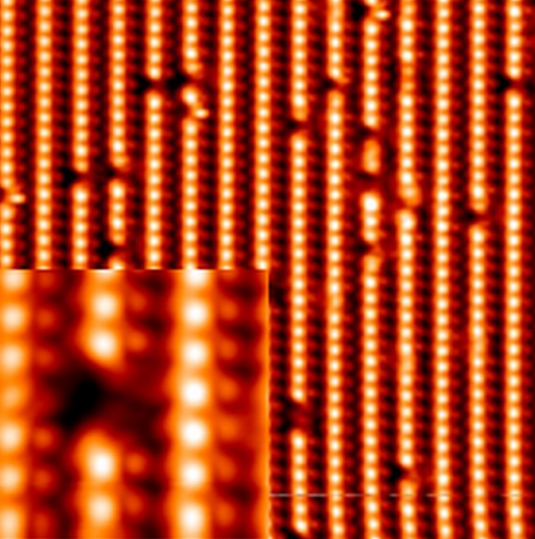Description of the completed project
Isolators can be topologically trivial in the form of a normal isolator and topologically non-trivial, otherwise known as a topological insulator (TI). The non-trivial topological form (if it exists) means the occurrence of topological states on the crystal surfaces with the amazing feature of the lack of electrical resistance for electric currents flowing on the surface. In the case of a two-dimensional topological (thin film) insulator (2D), the topological states are localized on the edges. Consequently, in a one-dimensional system (e.g. in an atomic chain) (1D) such a state can occur at the ends of an atomic structure. While the study of 3D and 2D topological materials is carried out in numerous laboratories, 1D systems, due to the difficulty of their production and the limited range of research methods adapted to the measurement of extremely small systems, they are still little known.
The aim of the project was an attempt to create a topological insulator in the form of a built-up chain from single atoms and to study and describe its physical properties. It is worth mentioning that this type of research requires highly specialized experimental equipment and advanced computational methods. The first, fundamental difficulty is caused by the size of objects in the form of several or several dozen atoms (the smallest viruses are made of tens of thousands of atoms). Secondly, even the smallest amount of gas (air) in the environment dramatically changes the properties of each atom in the chain. For these reasons, the processes of production and studying of atomic chains were carried out under ultra-high vacuum (UHV) conditions (10-14 bar, which corresponds to a pressure in the distant vacuum of space) and using a scanning tunneling microscope. On the crystal with a previously prepared surface containing regularly arranged parallel rows of active atoms, atoms of various metals (Pb, Bi, Au, Sb and In) were deposited. Using the phenomenon of surface diffusion of atoms and self-assembly, atomic structured chains were produced from a few to several dozen atoms, as shown in the attached figure.
 An example of a topographic image of double atomic chain Si-In on the surface of a Si crystal taken with a scanning tunneling microscope (STM). The larger image shows the surface with dimensions of 25nm x 25nm and the smaller one shows its fragment 5nm x 5nm. Images were recorded with sample bias V = +1V and tunneling current I = 20pA
An example of a topographic image of double atomic chain Si-In on the surface of a Si crystal taken with a scanning tunneling microscope (STM). The larger image shows the surface with dimensions of 25nm x 25nm and the smaller one shows its fragment 5nm x 5nm. Images were recorded with sample bias V = +1V and tunneling current I = 20pA
The optimal method for studying the properties of nanostructures are scanning microscopy and tunneling spectroscopy (STM and STS). By this method, we found the presence of a non-trivial topological state in Si-In atomic chains. Another type of chain, built of Sb atoms, had the characteristics of a perfect one-dimensional metal. The results of experimental studies were used to construct theoretical models of nanostructures and calculate their stationary and time-dependent electrical properties using DFT, tight binding and evolution operator methods.
The main effect of the project is to demonstrate that by using the phenomenon of self-organization it is possible to create atomic chains with topological states. Both chains with topological states and those with perfect metal characteristics are of great interest because of their potential applications in the creation of extremely thin wires and active nanoelectronics components.
Project description
A progress in miniaturizing of electronic devices meets several technological barriers and, moreover, more fundamental problems arise because of dominant quantum effects. It becomes particularly important in one-dimensional (1D) nanostructures. In series of publication we showed that in some specific circumstances, using Molecular Beam Epitaxy technology and due to selfassembly processes, metallic atoms form matrices of ordered chains on a stepped surface of a monocrystal (vicinal surface). Monoatomic chains at the surface can be regarded as ultimately small conductors for future nanometer-size electronic devices with many potential applications.
The project aims experimental and theoretical investigation of 1D topological states in atomic chains fabricated on vicinal and flat semiconducting surfaces. The goal of the project is to understand physical processes governing creation and control of non-trivial topological states is such 1D structures. Matrices of atomic chains with non-trivial topological states can be regarded as a new material with unique electrical properties. We presume, that the presence of topological states in atomic chains, and in more complex structures composed of atomic chains, will enhance their surface electrical conductivity.
In order to establish conditions necessary to create and to preserve topological state in the system extensive calculations of electronic properties of topological atomic chains on crystalline substrate will be performed.
The goal of the project is to find atomic systems exhibiting spindependent Friedel oscillations and induced topological states. Unique equipment consisting of Scanning Tunnelling Microscope (STM) with spin-resolution capabilities and Atomic Force Microscope (AFM) operating in ultra-high vacuum (p~10-11 -mbar) and at liquid helium temperatures (4.2K) allow for imaging of single atom, for manipulation of atoms, and for characterization of a local electronic and spin structure.
The proposed studies are novel. To our best knowledge fabrication and investigation of 1D topological insulators on modified vicinal surfaces were not reported yet. The studies allow for comprehensive description of nontrivial states in atomic chains. The knowledge of electronic and electric properties of such atomic chains may contribute to their future application in spintronics, in quantum computers, and in nanoelements demanding ultrafast electric connections (logical gates, qubits, nanotransistors).


